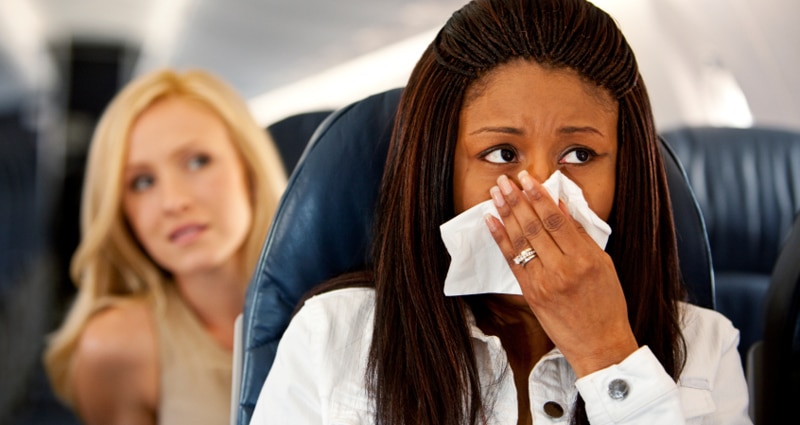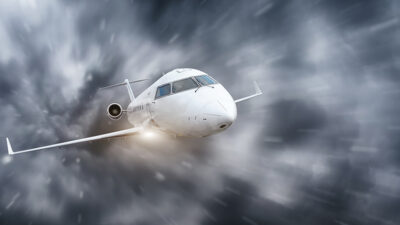Medical Advisory: Preventing Influenza During Travel

Like it or not, many passengers traveling on your aircraft will bring more than their hand luggage on board with them. Many will bring along the influenza virus and spread it among passengers and crew.
So, how can you ensure the health of your passengers and crew during influenza season? Start by recognizing the signs and symptoms of influenza and arm yourself with prevention strategies.
What is influenza?
Influenza, or the “flu” is a respiratory virus that is easily spread by coughing, sneezing or talking. Influenza can land on surfaces such as tray tables, arm rests, utensils, glassware and door knobs and then, when another person touches those surfaces and rubs his nose or eyes, he can “self-inoculate” and introduce the virus into his mucous membranes.
The influenza season
In the Northern Hemisphere, the onset of flu season usually begins in October and increases among the general population until early spring. Meanwhile, in the Southern Hemisphere, the flu season typically runs from April through September. Therefore, travelers must be aware that it is flu season all the time somewhere in the world.
How to recognize influenza
The US Centers for Disease Control and Prevention (CDC) reports that healthy adults are able to infect other people with the flu one day before they experience symptoms and five days after getting sick. It is important to recognize the signs of flu and avoid contact with other people to help prevent the spread of disease.
The most common signs of influenza, according to the CDC, are:
- Coughing
- A runny or stuffy nose
- Fever or chills
- Body aches and fatigue
- Headaches
- Diarrhea (more commonly in children than adults).
Many other respiratory illnesses have similar signs and symptoms to the flu, which can make it difficult to distinguish between a common cold and the seasonal influenza.
To help prevent influenza, pass on the following advice to your passengers and crew:
- Obtain a seasonal flu vaccine
- Avoid close contact with other people
- Avoid travel when you are sick
- Cover your mouth and nose with a tissue when coughing or sneezing, and then throw the tissue away
- Wash your hands frequently with soap/water/friction and use a towel to dry your hands. Use a hand gel in between hand washings to clean your hands.
- Avoid touching your eyes, nose or mouth. Viruses are often spread by touching contaminated surfaces and then touching the eyes/nose/mouth.
- Clean surfaces frequently. Clean tray tables/hand rests, door knobs, control panels, phones and keyboards with a disinfectant. Carry disinfectant surface cleaners when traveling to clean surfaces in the hotel, such as the TV controls and telephones.
- Stay in good health. Eat a healthy diet, manage your stress, exercise and get plenty of sleep.
- Do not smoke
To help prevent the spread of influenza, advise your passengers and crew to take the following steps:
- Stay home and avoid contact with other people
- Rest as much as possible
- Drink plenty of fluids
High-risk individuals – the elderly, young children and people with chronic illnesses – are particularly susceptible to serious complications from the flu and should seek medical attention for:
- shortness of breath or difficulty breathing
- dehydration/vomiting/severe diarrhea
- worsening of medical conditions
- profound weakness/fatigue
High-risk individuals may benefit from specific medical treatment and should contact their personal physicians before traveling.
Don’t let influenza slow down your crew or passengers this season. Prevention of the virus is the key to healthy crew and passengers aboard your aircraft. Paying close attention to personal hygiene, frequent hand-washing and vaccinations may be the only steps necessary to stop influenza.
Resources available:
Centers for Disease Control and Prevention (CDC) – www.cdc.gov
MedAire, Inc. – www.medaire.com
World Health Organization (WHO) – www.who.int

Flight departments around the world rely on MedAire, an International SOS company, to reduce their travel safety risks. Crews are trained on the resources to manage in-flight illness and injury with onboard medical equipment and telemedicine assistance. On the ground, passengers and crew have one resource for medical referrals; guaranteed payments for medical expenses; assistance with lost documents and prescriptions; online and e-mail travel advisories; evacuation support and a host of other services.
http://www.medaire.com/
© 2024 MedAire Worldwide. All Rights Reserved.
Next ArticleRelated Posts

Understanding the Challenge of Turbulence-Related Injuries in Business Aviation
The challenge of managing air turbulence in business and private aviation is becoming increasingly evident due to the growing number of turbulence-related incidents affecting aircraft operators across the industry.

A Flight Toward Well-Being: The Changing Landscape of Mental Health in Aviation
As the Global Director of Aviation Health at MedAire, I have witnessed firsthand the incredible strides our industry has made in addressing mental health issues among pilots.

